Developing Management, Leadership, and Stewardship Skills Reflection
VerifiedAdded on 2020/05/11
|7
|2066
|87
Report
AI Summary
This report reflects on the interconnectedness and distinctions between management, leadership, and stewardship. The author, drawing from personal experiences and relevant literature, discusses the evolution of these concepts and their importance in professional development. The report emphasizes the significance of communication, interpersonal relationships, team building, and financial understanding in effective management. It highlights the essential leadership skills of clear communication, motivation, delegation, and trustworthiness. Moreover, it underscores the role of stewardship in aligning organizational and employee interests, focusing on self-examination, stakeholder rewards, and high expectations. The author concludes that mastering management, leadership, and stewardship is crucial for career success, offering insights into how these qualities contribute to a well-rounded professional profile and organizational success. The report utilizes examples such as the King Gee role play, and discusses the importance of building trust and being creative in problem-solving within a team environment.
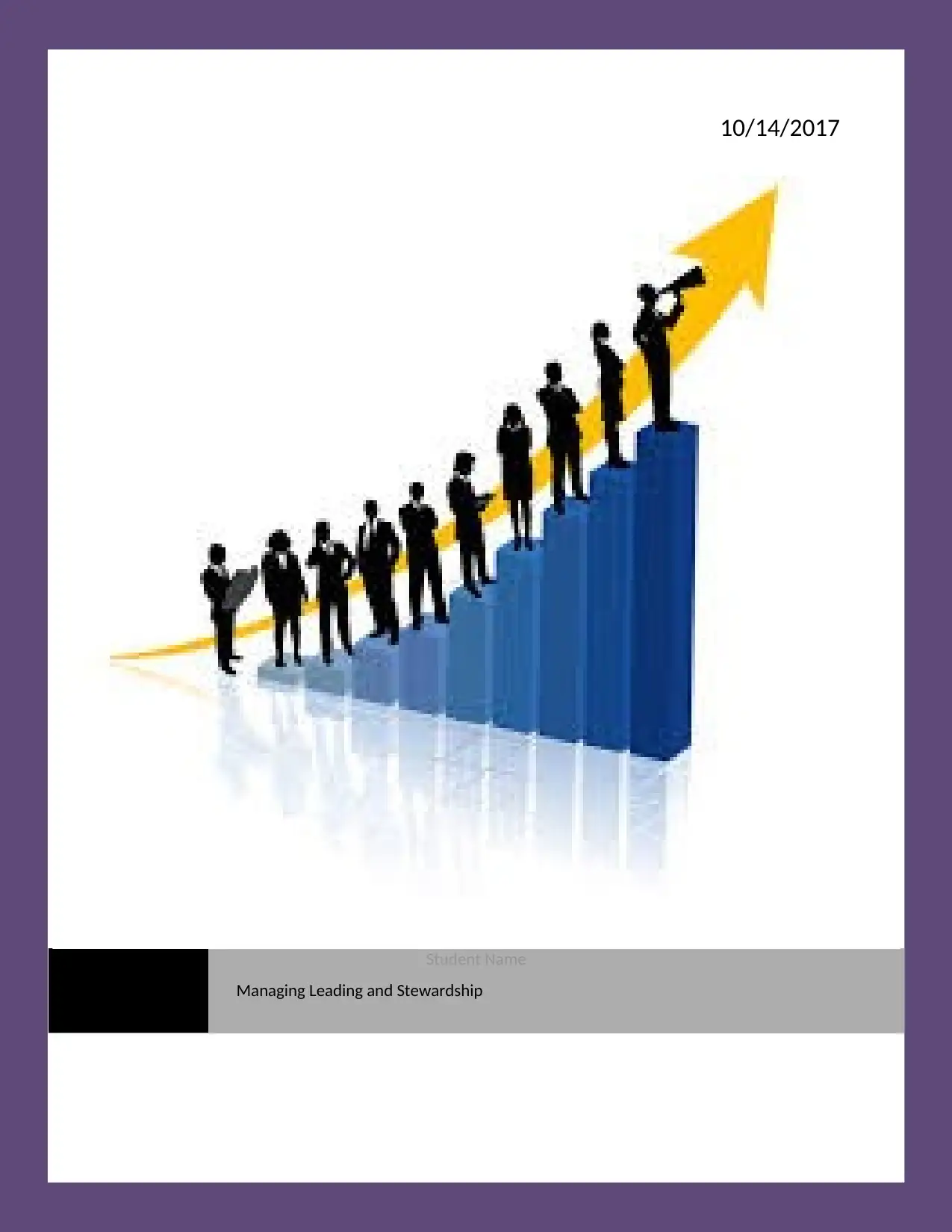
10/14/2017
Student Name
Managing Leading and Stewardship
Student Name
Managing Leading and Stewardship
Paraphrase This Document
Need a fresh take? Get an instant paraphrase of this document with our AI Paraphraser
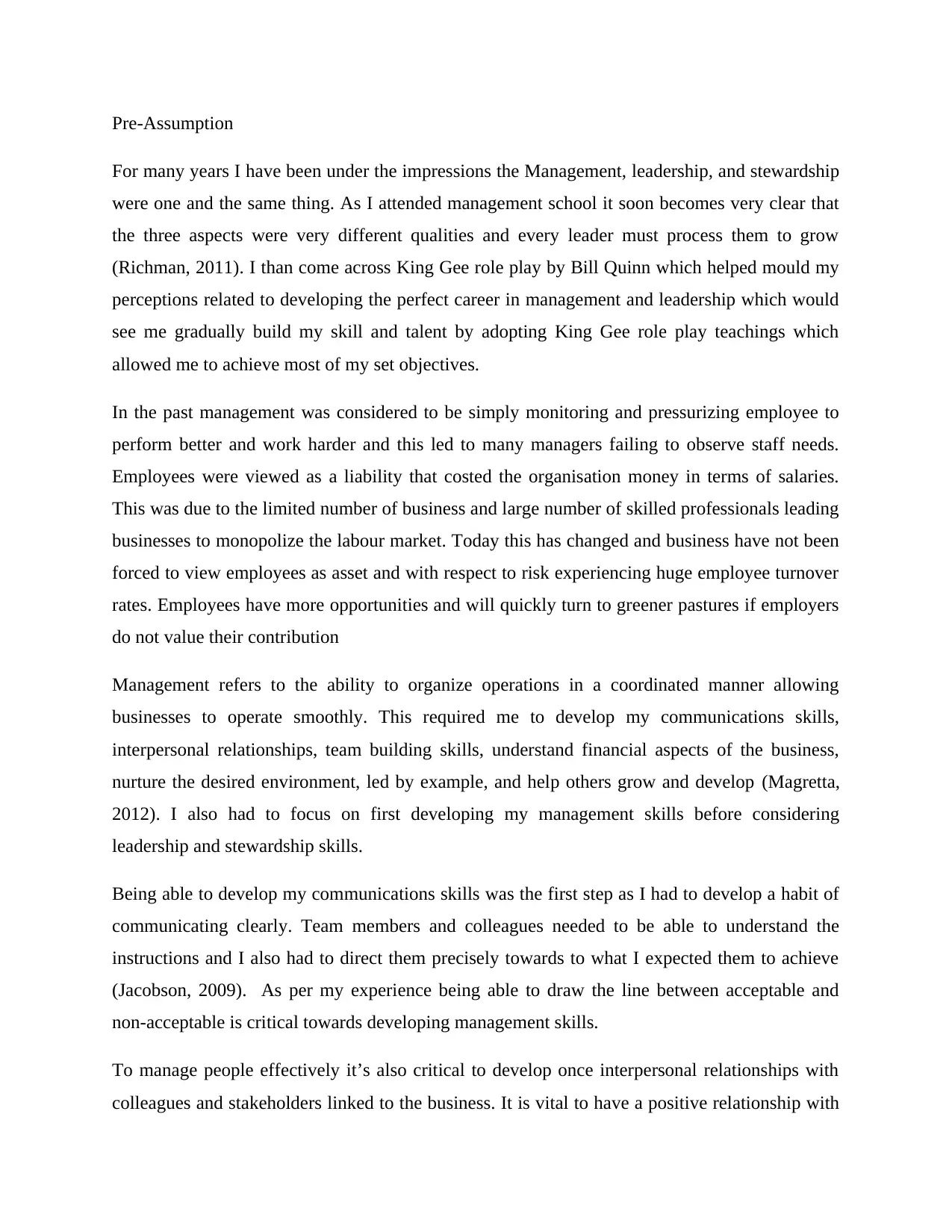
Pre-Assumption
For many years I have been under the impressions the Management, leadership, and stewardship
were one and the same thing. As I attended management school it soon becomes very clear that
the three aspects were very different qualities and every leader must process them to grow
(Richman, 2011). I than come across King Gee role play by Bill Quinn which helped mould my
perceptions related to developing the perfect career in management and leadership which would
see me gradually build my skill and talent by adopting King Gee role play teachings which
allowed me to achieve most of my set objectives.
In the past management was considered to be simply monitoring and pressurizing employee to
perform better and work harder and this led to many managers failing to observe staff needs.
Employees were viewed as a liability that costed the organisation money in terms of salaries.
This was due to the limited number of business and large number of skilled professionals leading
businesses to monopolize the labour market. Today this has changed and business have not been
forced to view employees as asset and with respect to risk experiencing huge employee turnover
rates. Employees have more opportunities and will quickly turn to greener pastures if employers
do not value their contribution
Management refers to the ability to organize operations in a coordinated manner allowing
businesses to operate smoothly. This required me to develop my communications skills,
interpersonal relationships, team building skills, understand financial aspects of the business,
nurture the desired environment, led by example, and help others grow and develop (Magretta,
2012). I also had to focus on first developing my management skills before considering
leadership and stewardship skills.
Being able to develop my communications skills was the first step as I had to develop a habit of
communicating clearly. Team members and colleagues needed to be able to understand the
instructions and I also had to direct them precisely towards to what I expected them to achieve
(Jacobson, 2009). As per my experience being able to draw the line between acceptable and
non-acceptable is critical towards developing management skills.
To manage people effectively it’s also critical to develop once interpersonal relationships with
colleagues and stakeholders linked to the business. It is vital to have a positive relationship with
For many years I have been under the impressions the Management, leadership, and stewardship
were one and the same thing. As I attended management school it soon becomes very clear that
the three aspects were very different qualities and every leader must process them to grow
(Richman, 2011). I than come across King Gee role play by Bill Quinn which helped mould my
perceptions related to developing the perfect career in management and leadership which would
see me gradually build my skill and talent by adopting King Gee role play teachings which
allowed me to achieve most of my set objectives.
In the past management was considered to be simply monitoring and pressurizing employee to
perform better and work harder and this led to many managers failing to observe staff needs.
Employees were viewed as a liability that costed the organisation money in terms of salaries.
This was due to the limited number of business and large number of skilled professionals leading
businesses to monopolize the labour market. Today this has changed and business have not been
forced to view employees as asset and with respect to risk experiencing huge employee turnover
rates. Employees have more opportunities and will quickly turn to greener pastures if employers
do not value their contribution
Management refers to the ability to organize operations in a coordinated manner allowing
businesses to operate smoothly. This required me to develop my communications skills,
interpersonal relationships, team building skills, understand financial aspects of the business,
nurture the desired environment, led by example, and help others grow and develop (Magretta,
2012). I also had to focus on first developing my management skills before considering
leadership and stewardship skills.
Being able to develop my communications skills was the first step as I had to develop a habit of
communicating clearly. Team members and colleagues needed to be able to understand the
instructions and I also had to direct them precisely towards to what I expected them to achieve
(Jacobson, 2009). As per my experience being able to draw the line between acceptable and
non-acceptable is critical towards developing management skills.
To manage people effectively it’s also critical to develop once interpersonal relationships with
colleagues and stakeholders linked to the business. It is vital to have a positive relationship with
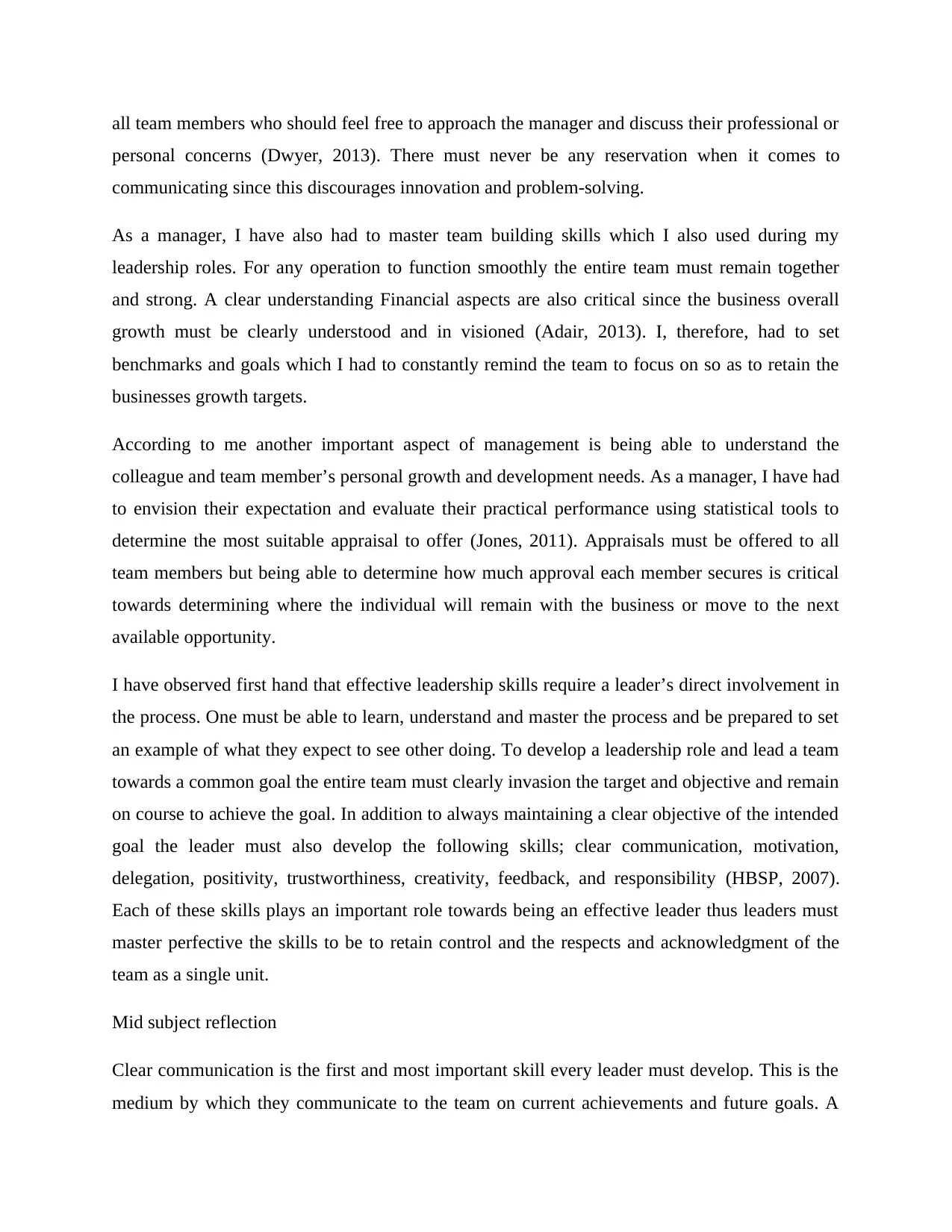
all team members who should feel free to approach the manager and discuss their professional or
personal concerns (Dwyer, 2013). There must never be any reservation when it comes to
communicating since this discourages innovation and problem-solving.
As a manager, I have also had to master team building skills which I also used during my
leadership roles. For any operation to function smoothly the entire team must remain together
and strong. A clear understanding Financial aspects are also critical since the business overall
growth must be clearly understood and in visioned (Adair, 2013). I, therefore, had to set
benchmarks and goals which I had to constantly remind the team to focus on so as to retain the
businesses growth targets.
According to me another important aspect of management is being able to understand the
colleague and team member’s personal growth and development needs. As a manager, I have had
to envision their expectation and evaluate their practical performance using statistical tools to
determine the most suitable appraisal to offer (Jones, 2011). Appraisals must be offered to all
team members but being able to determine how much approval each member secures is critical
towards determining where the individual will remain with the business or move to the next
available opportunity.
I have observed first hand that effective leadership skills require a leader’s direct involvement in
the process. One must be able to learn, understand and master the process and be prepared to set
an example of what they expect to see other doing. To develop a leadership role and lead a team
towards a common goal the entire team must clearly invasion the target and objective and remain
on course to achieve the goal. In addition to always maintaining a clear objective of the intended
goal the leader must also develop the following skills; clear communication, motivation,
delegation, positivity, trustworthiness, creativity, feedback, and responsibility (HBSP, 2007).
Each of these skills plays an important role towards being an effective leader thus leaders must
master perfective the skills to be to retain control and the respects and acknowledgment of the
team as a single unit.
Mid subject reflection
Clear communication is the first and most important skill every leader must develop. This is the
medium by which they communicate to the team on current achievements and future goals. A
personal concerns (Dwyer, 2013). There must never be any reservation when it comes to
communicating since this discourages innovation and problem-solving.
As a manager, I have also had to master team building skills which I also used during my
leadership roles. For any operation to function smoothly the entire team must remain together
and strong. A clear understanding Financial aspects are also critical since the business overall
growth must be clearly understood and in visioned (Adair, 2013). I, therefore, had to set
benchmarks and goals which I had to constantly remind the team to focus on so as to retain the
businesses growth targets.
According to me another important aspect of management is being able to understand the
colleague and team member’s personal growth and development needs. As a manager, I have had
to envision their expectation and evaluate their practical performance using statistical tools to
determine the most suitable appraisal to offer (Jones, 2011). Appraisals must be offered to all
team members but being able to determine how much approval each member secures is critical
towards determining where the individual will remain with the business or move to the next
available opportunity.
I have observed first hand that effective leadership skills require a leader’s direct involvement in
the process. One must be able to learn, understand and master the process and be prepared to set
an example of what they expect to see other doing. To develop a leadership role and lead a team
towards a common goal the entire team must clearly invasion the target and objective and remain
on course to achieve the goal. In addition to always maintaining a clear objective of the intended
goal the leader must also develop the following skills; clear communication, motivation,
delegation, positivity, trustworthiness, creativity, feedback, and responsibility (HBSP, 2007).
Each of these skills plays an important role towards being an effective leader thus leaders must
master perfective the skills to be to retain control and the respects and acknowledgment of the
team as a single unit.
Mid subject reflection
Clear communication is the first and most important skill every leader must develop. This is the
medium by which they communicate to the team on current achievements and future goals. A
⊘ This is a preview!⊘
Do you want full access?
Subscribe today to unlock all pages.

Trusted by 1+ million students worldwide
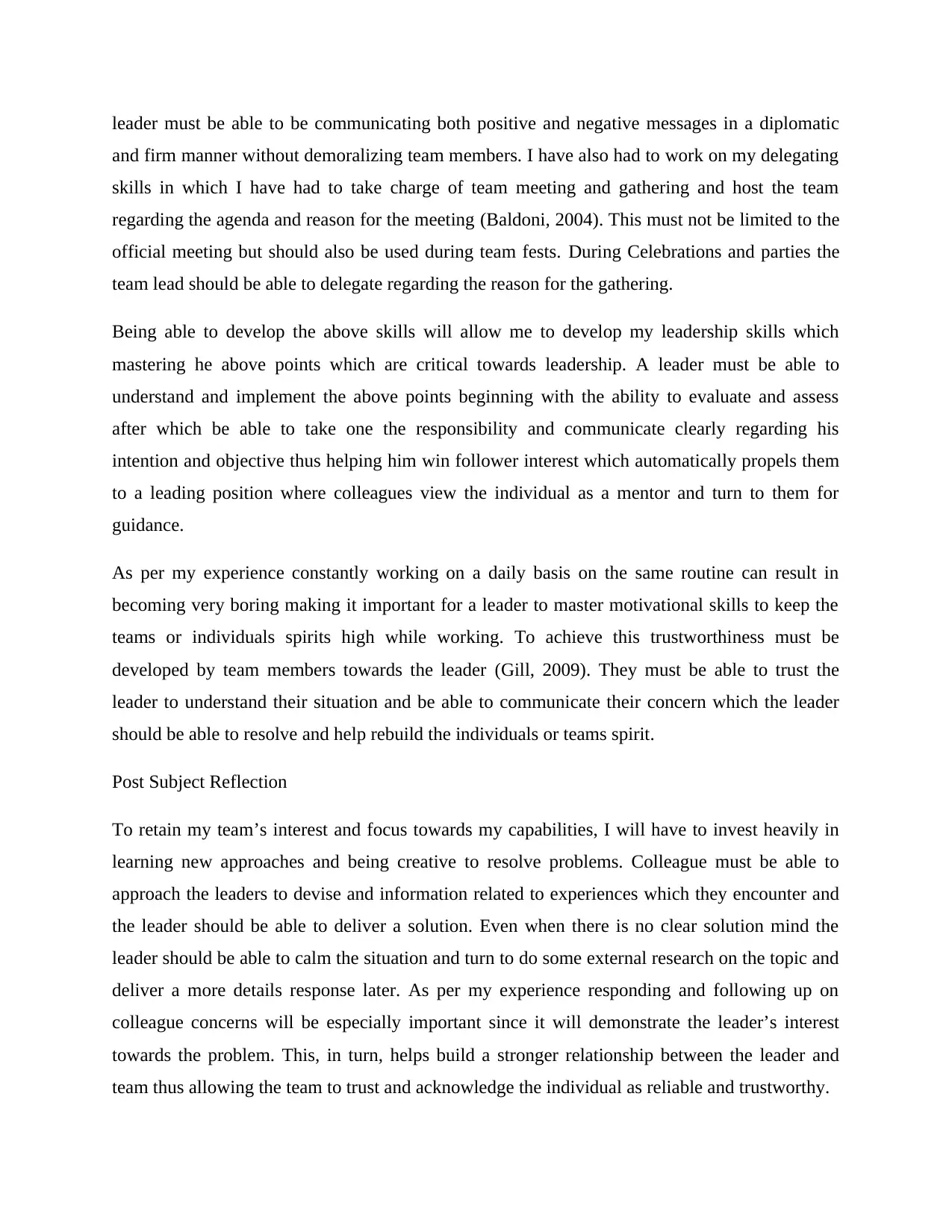
leader must be able to be communicating both positive and negative messages in a diplomatic
and firm manner without demoralizing team members. I have also had to work on my delegating
skills in which I have had to take charge of team meeting and gathering and host the team
regarding the agenda and reason for the meeting (Baldoni, 2004). This must not be limited to the
official meeting but should also be used during team fests. During Celebrations and parties the
team lead should be able to delegate regarding the reason for the gathering.
Being able to develop the above skills will allow me to develop my leadership skills which
mastering he above points which are critical towards leadership. A leader must be able to
understand and implement the above points beginning with the ability to evaluate and assess
after which be able to take one the responsibility and communicate clearly regarding his
intention and objective thus helping him win follower interest which automatically propels them
to a leading position where colleagues view the individual as a mentor and turn to them for
guidance.
As per my experience constantly working on a daily basis on the same routine can result in
becoming very boring making it important for a leader to master motivational skills to keep the
teams or individuals spirits high while working. To achieve this trustworthiness must be
developed by team members towards the leader (Gill, 2009). They must be able to trust the
leader to understand their situation and be able to communicate their concern which the leader
should be able to resolve and help rebuild the individuals or teams spirit.
Post Subject Reflection
To retain my team’s interest and focus towards my capabilities, I will have to invest heavily in
learning new approaches and being creative to resolve problems. Colleague must be able to
approach the leaders to devise and information related to experiences which they encounter and
the leader should be able to deliver a solution. Even when there is no clear solution mind the
leader should be able to calm the situation and turn to do some external research on the topic and
deliver a more details response later. As per my experience responding and following up on
colleague concerns will be especially important since it will demonstrate the leader’s interest
towards the problem. This, in turn, helps build a stronger relationship between the leader and
team thus allowing the team to trust and acknowledge the individual as reliable and trustworthy.
and firm manner without demoralizing team members. I have also had to work on my delegating
skills in which I have had to take charge of team meeting and gathering and host the team
regarding the agenda and reason for the meeting (Baldoni, 2004). This must not be limited to the
official meeting but should also be used during team fests. During Celebrations and parties the
team lead should be able to delegate regarding the reason for the gathering.
Being able to develop the above skills will allow me to develop my leadership skills which
mastering he above points which are critical towards leadership. A leader must be able to
understand and implement the above points beginning with the ability to evaluate and assess
after which be able to take one the responsibility and communicate clearly regarding his
intention and objective thus helping him win follower interest which automatically propels them
to a leading position where colleagues view the individual as a mentor and turn to them for
guidance.
As per my experience constantly working on a daily basis on the same routine can result in
becoming very boring making it important for a leader to master motivational skills to keep the
teams or individuals spirits high while working. To achieve this trustworthiness must be
developed by team members towards the leader (Gill, 2009). They must be able to trust the
leader to understand their situation and be able to communicate their concern which the leader
should be able to resolve and help rebuild the individuals or teams spirit.
Post Subject Reflection
To retain my team’s interest and focus towards my capabilities, I will have to invest heavily in
learning new approaches and being creative to resolve problems. Colleague must be able to
approach the leaders to devise and information related to experiences which they encounter and
the leader should be able to deliver a solution. Even when there is no clear solution mind the
leader should be able to calm the situation and turn to do some external research on the topic and
deliver a more details response later. As per my experience responding and following up on
colleague concerns will be especially important since it will demonstrate the leader’s interest
towards the problem. This, in turn, helps build a stronger relationship between the leader and
team thus allowing the team to trust and acknowledge the individual as reliable and trustworthy.
Paraphrase This Document
Need a fresh take? Get an instant paraphrase of this document with our AI Paraphraser
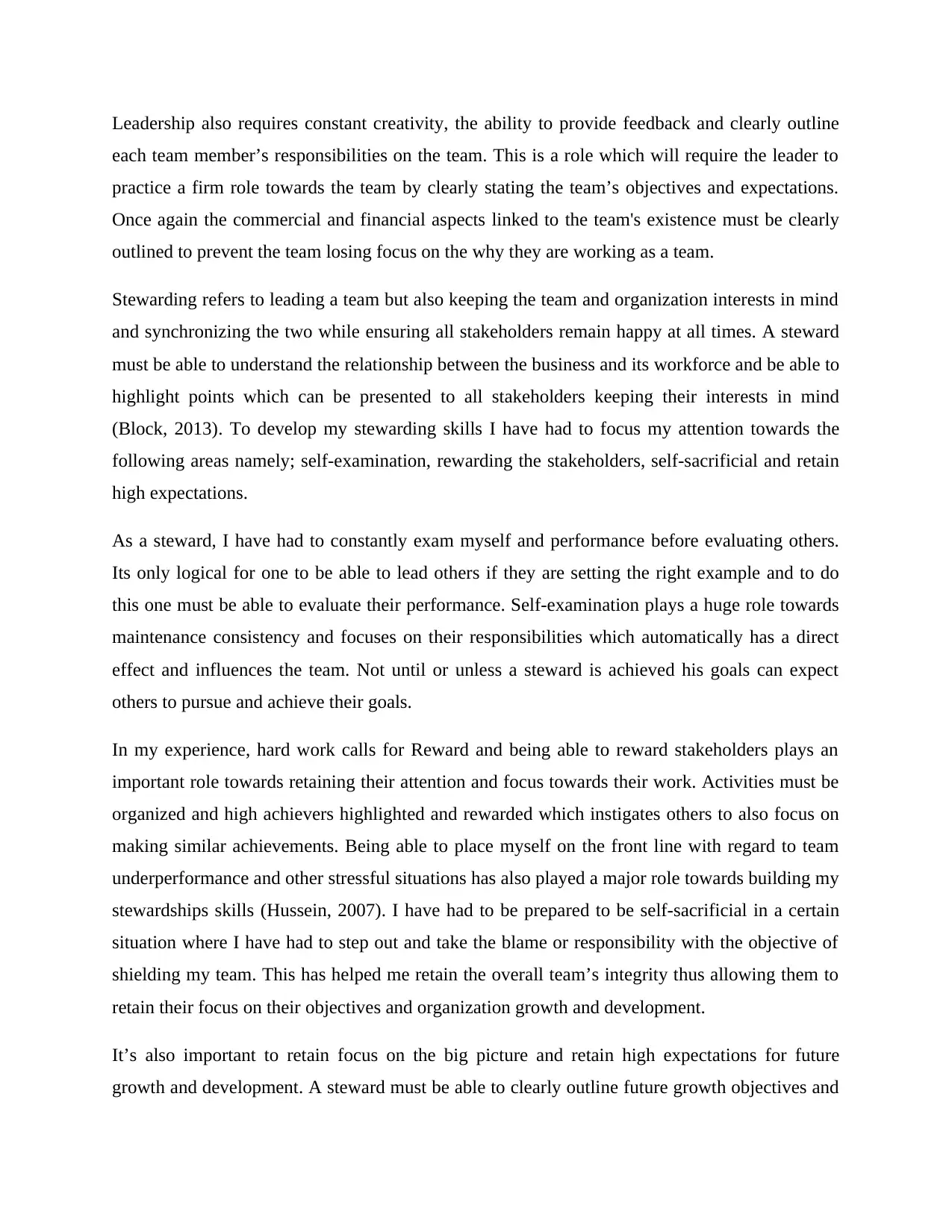
Leadership also requires constant creativity, the ability to provide feedback and clearly outline
each team member’s responsibilities on the team. This is a role which will require the leader to
practice a firm role towards the team by clearly stating the team’s objectives and expectations.
Once again the commercial and financial aspects linked to the team's existence must be clearly
outlined to prevent the team losing focus on the why they are working as a team.
Stewarding refers to leading a team but also keeping the team and organization interests in mind
and synchronizing the two while ensuring all stakeholders remain happy at all times. A steward
must be able to understand the relationship between the business and its workforce and be able to
highlight points which can be presented to all stakeholders keeping their interests in mind
(Block, 2013). To develop my stewarding skills I have had to focus my attention towards the
following areas namely; self-examination, rewarding the stakeholders, self-sacrificial and retain
high expectations.
As a steward, I have had to constantly exam myself and performance before evaluating others.
Its only logical for one to be able to lead others if they are setting the right example and to do
this one must be able to evaluate their performance. Self-examination plays a huge role towards
maintenance consistency and focuses on their responsibilities which automatically has a direct
effect and influences the team. Not until or unless a steward is achieved his goals can expect
others to pursue and achieve their goals.
In my experience, hard work calls for Reward and being able to reward stakeholders plays an
important role towards retaining their attention and focus towards their work. Activities must be
organized and high achievers highlighted and rewarded which instigates others to also focus on
making similar achievements. Being able to place myself on the front line with regard to team
underperformance and other stressful situations has also played a major role towards building my
stewardships skills (Hussein, 2007). I have had to be prepared to be self-sacrificial in a certain
situation where I have had to step out and take the blame or responsibility with the objective of
shielding my team. This has helped me retain the overall team’s integrity thus allowing them to
retain their focus on their objectives and organization growth and development.
It’s also important to retain focus on the big picture and retain high expectations for future
growth and development. A steward must be able to clearly outline future growth objectives and
each team member’s responsibilities on the team. This is a role which will require the leader to
practice a firm role towards the team by clearly stating the team’s objectives and expectations.
Once again the commercial and financial aspects linked to the team's existence must be clearly
outlined to prevent the team losing focus on the why they are working as a team.
Stewarding refers to leading a team but also keeping the team and organization interests in mind
and synchronizing the two while ensuring all stakeholders remain happy at all times. A steward
must be able to understand the relationship between the business and its workforce and be able to
highlight points which can be presented to all stakeholders keeping their interests in mind
(Block, 2013). To develop my stewarding skills I have had to focus my attention towards the
following areas namely; self-examination, rewarding the stakeholders, self-sacrificial and retain
high expectations.
As a steward, I have had to constantly exam myself and performance before evaluating others.
Its only logical for one to be able to lead others if they are setting the right example and to do
this one must be able to evaluate their performance. Self-examination plays a huge role towards
maintenance consistency and focuses on their responsibilities which automatically has a direct
effect and influences the team. Not until or unless a steward is achieved his goals can expect
others to pursue and achieve their goals.
In my experience, hard work calls for Reward and being able to reward stakeholders plays an
important role towards retaining their attention and focus towards their work. Activities must be
organized and high achievers highlighted and rewarded which instigates others to also focus on
making similar achievements. Being able to place myself on the front line with regard to team
underperformance and other stressful situations has also played a major role towards building my
stewardships skills (Hussein, 2007). I have had to be prepared to be self-sacrificial in a certain
situation where I have had to step out and take the blame or responsibility with the objective of
shielding my team. This has helped me retain the overall team’s integrity thus allowing them to
retain their focus on their objectives and organization growth and development.
It’s also important to retain focus on the big picture and retain high expectations for future
growth and development. A steward must be able to clearly outline future growth objectives and
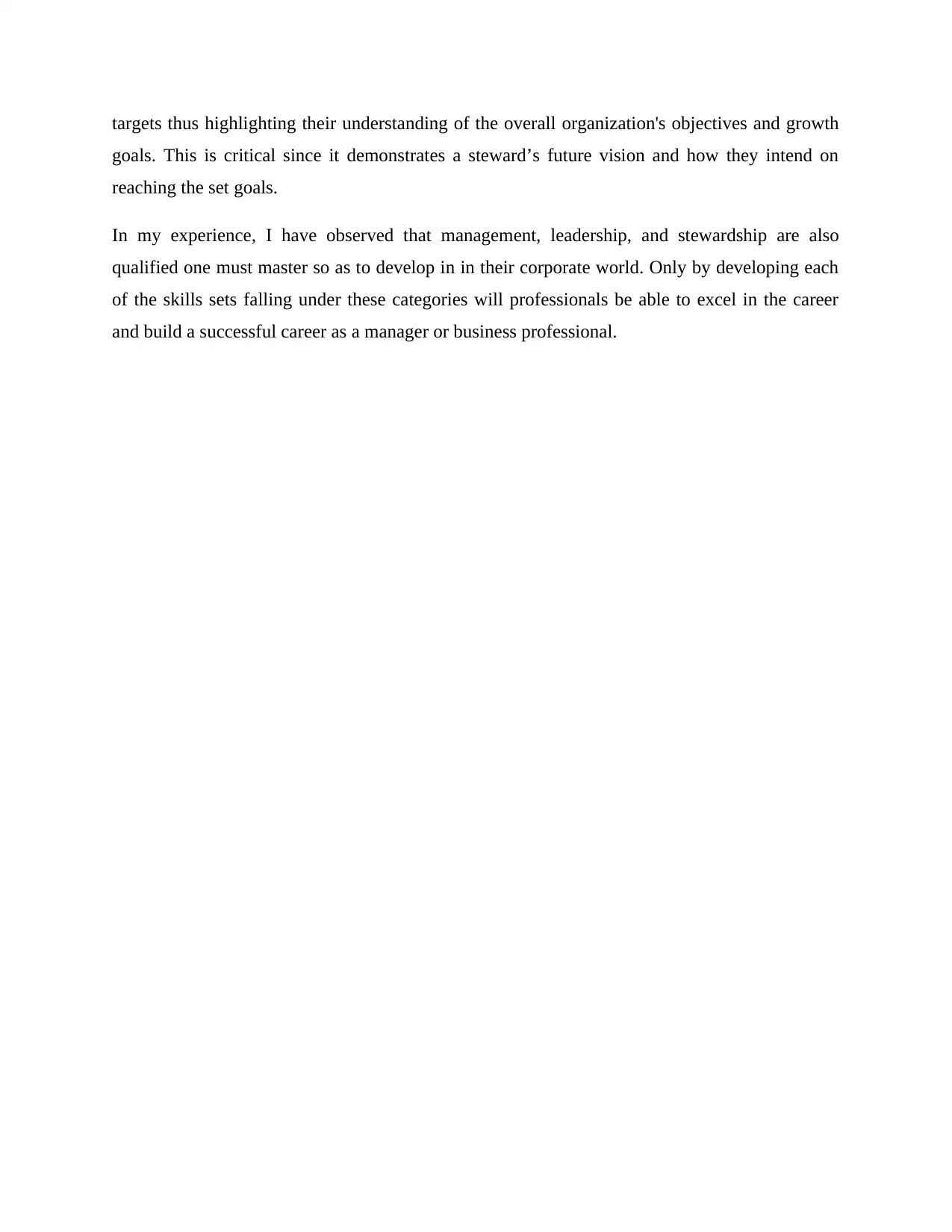
targets thus highlighting their understanding of the overall organization's objectives and growth
goals. This is critical since it demonstrates a steward’s future vision and how they intend on
reaching the set goals.
In my experience, I have observed that management, leadership, and stewardship are also
qualified one must master so as to develop in in their corporate world. Only by developing each
of the skills sets falling under these categories will professionals be able to excel in the career
and build a successful career as a manager or business professional.
goals. This is critical since it demonstrates a steward’s future vision and how they intend on
reaching the set goals.
In my experience, I have observed that management, leadership, and stewardship are also
qualified one must master so as to develop in in their corporate world. Only by developing each
of the skills sets falling under these categories will professionals be able to excel in the career
and build a successful career as a manager or business professional.
⊘ This is a preview!⊘
Do you want full access?
Subscribe today to unlock all pages.

Trusted by 1+ million students worldwide
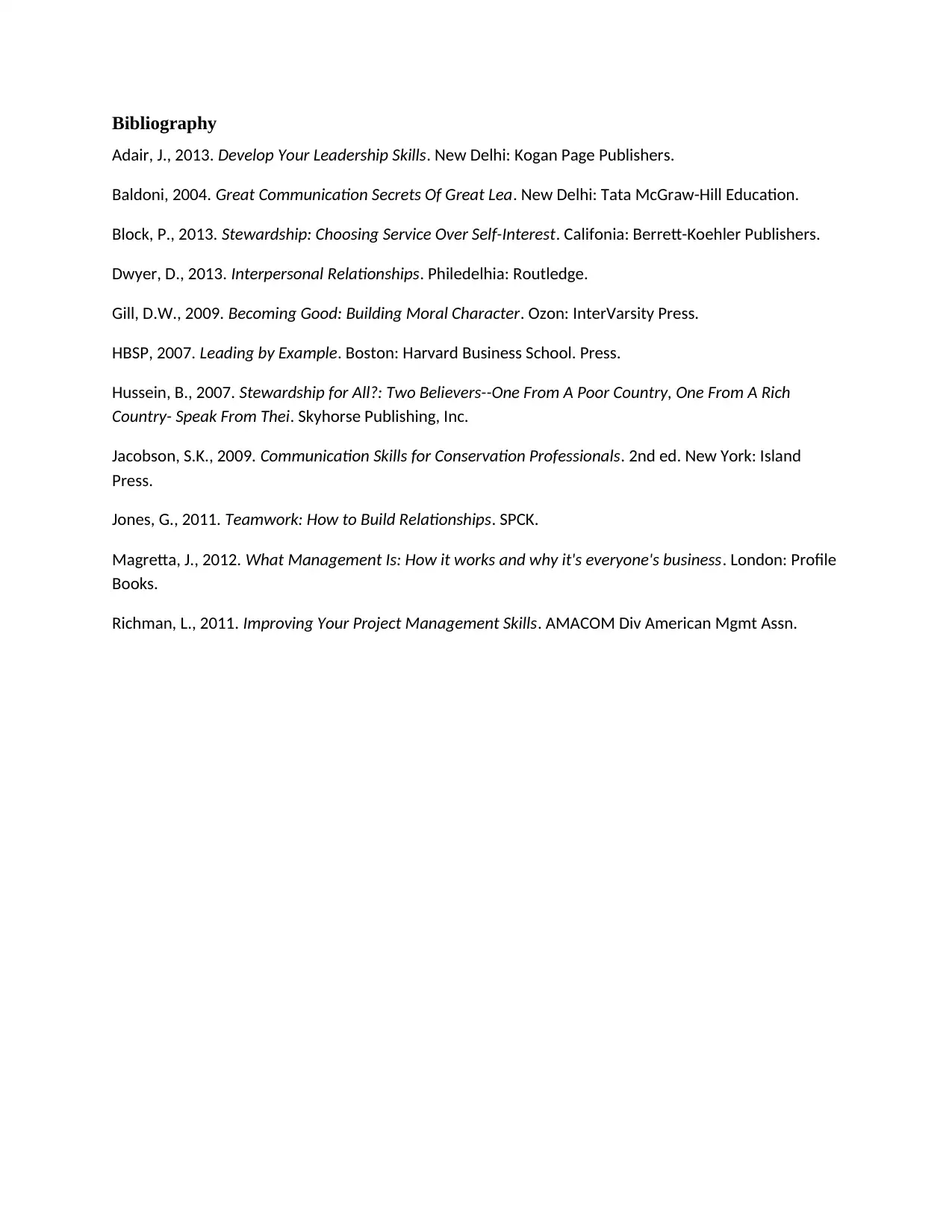
Bibliography
Adair, J., 2013. Develop Your Leadership Skills. New Delhi: Kogan Page Publishers.
Baldoni, 2004. Great Communication Secrets Of Great Lea. New Delhi: Tata McGraw-Hill Education.
Block, P., 2013. Stewardship: Choosing Service Over Self-Interest. Califonia: Berrett-Koehler Publishers.
Dwyer, D., 2013. Interpersonal Relationships. Philedelhia: Routledge.
Gill, D.W., 2009. Becoming Good: Building Moral Character. Ozon: InterVarsity Press.
HBSP, 2007. Leading by Example. Boston: Harvard Business School. Press.
Hussein, B., 2007. Stewardship for All?: Two Believers--One From A Poor Country, One From A Rich
Country- Speak From Thei. Skyhorse Publishing, Inc.
Jacobson, S.K., 2009. Communication Skills for Conservation Professionals. 2nd ed. New York: Island
Press.
Jones, G., 2011. Teamwork: How to Build Relationships. SPCK.
Magretta, J., 2012. What Management Is: How it works and why it's everyone's business. London: Profile
Books.
Richman, L., 2011. Improving Your Project Management Skills. AMACOM Div American Mgmt Assn.
Adair, J., 2013. Develop Your Leadership Skills. New Delhi: Kogan Page Publishers.
Baldoni, 2004. Great Communication Secrets Of Great Lea. New Delhi: Tata McGraw-Hill Education.
Block, P., 2013. Stewardship: Choosing Service Over Self-Interest. Califonia: Berrett-Koehler Publishers.
Dwyer, D., 2013. Interpersonal Relationships. Philedelhia: Routledge.
Gill, D.W., 2009. Becoming Good: Building Moral Character. Ozon: InterVarsity Press.
HBSP, 2007. Leading by Example. Boston: Harvard Business School. Press.
Hussein, B., 2007. Stewardship for All?: Two Believers--One From A Poor Country, One From A Rich
Country- Speak From Thei. Skyhorse Publishing, Inc.
Jacobson, S.K., 2009. Communication Skills for Conservation Professionals. 2nd ed. New York: Island
Press.
Jones, G., 2011. Teamwork: How to Build Relationships. SPCK.
Magretta, J., 2012. What Management Is: How it works and why it's everyone's business. London: Profile
Books.
Richman, L., 2011. Improving Your Project Management Skills. AMACOM Div American Mgmt Assn.
1 out of 7
Related Documents
Your All-in-One AI-Powered Toolkit for Academic Success.
+13062052269
info@desklib.com
Available 24*7 on WhatsApp / Email
![[object Object]](/_next/static/media/star-bottom.7253800d.svg)
Unlock your academic potential
Copyright © 2020–2026 A2Z Services. All Rights Reserved. Developed and managed by ZUCOL.





